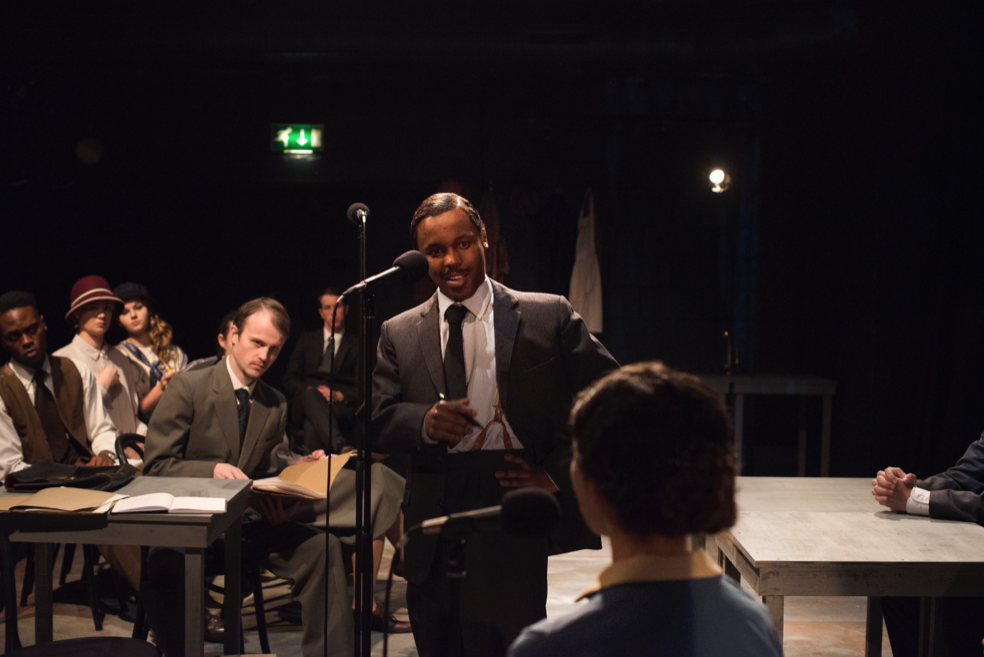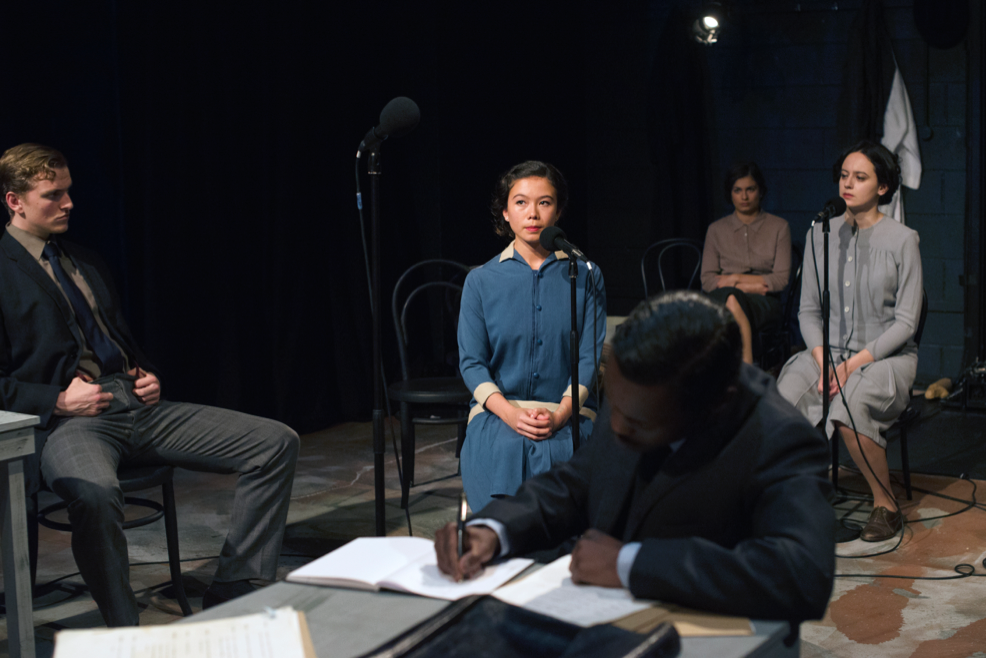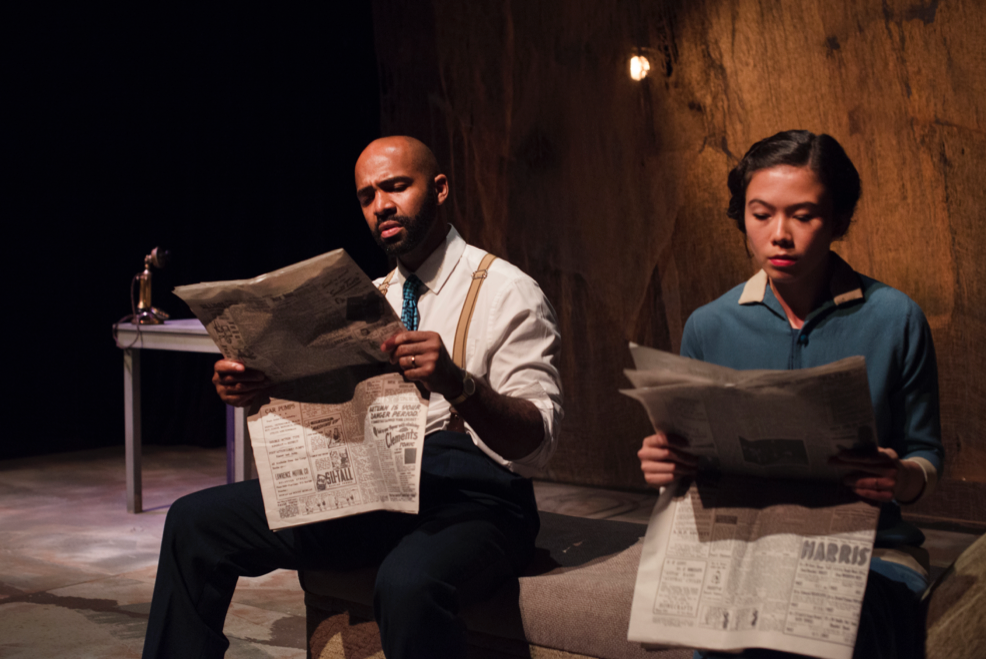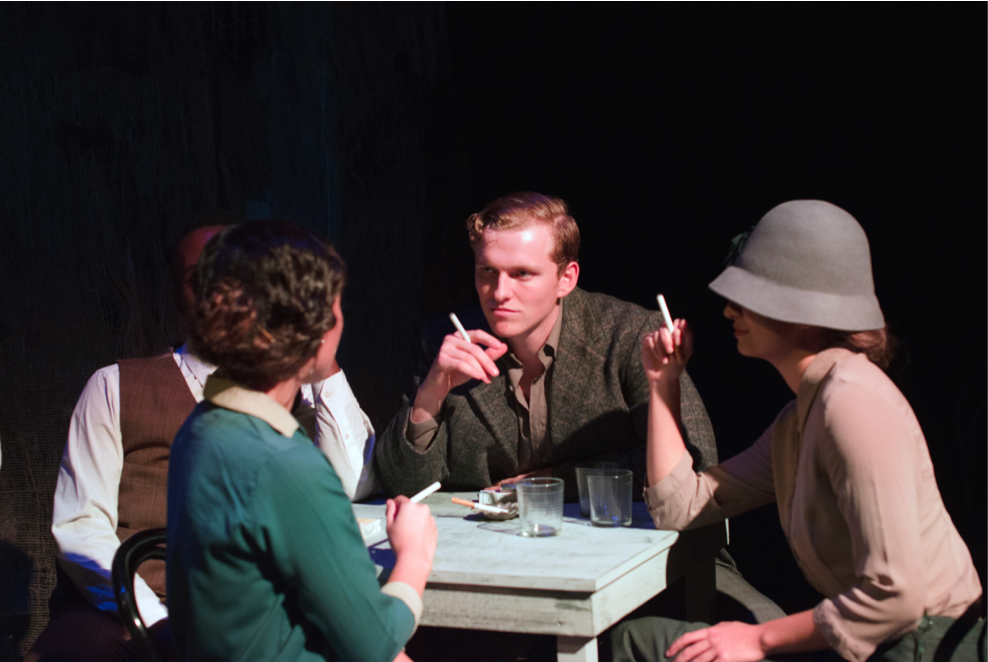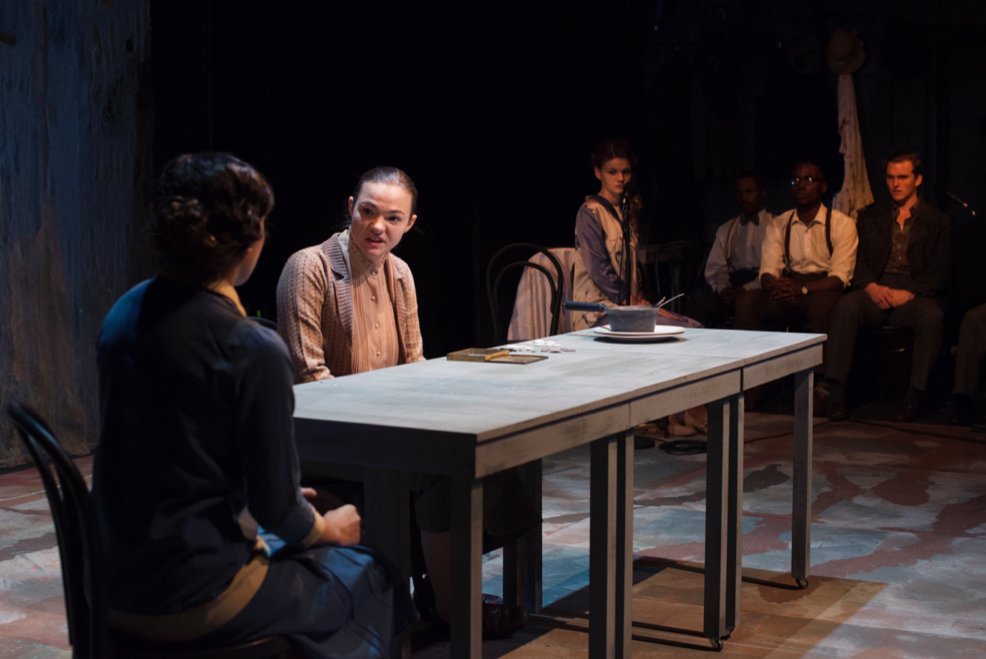Machinal
by Sophie Treadwell
Performed by 3rd Year BFA students
Birmingham School of Acting part of The Birmingham Conservatoire
Student Reflection 1
The process has made me realise that the art form needs to be highly intricate. Influences which don’t run in line with the action of the play, result in the loss of the fine work which we set out to create. We must be specific.
I asked a Brazilian friend to describe what complicité meant to her. She described it as a ball bouncing between two hands. This is what happens when actors are truly working with complicité with each other on stage. You talk about the “pleasure to play”. This is what hit me the hardest: when we are working with each other with complicité there is a pleasure derived from that which is palpable.
Throughout my training I have often been the ‘serious one’ : you’ve made me step back and find the young boy who used to run in his fields at home quoting Russell Crowe in Gladiator.
Student Reflection 2
I think being aware as a whole company of what is happening on stage, step by step, scene by scene, makes us open to react naturally and impulsively to real events on stage. The more I've practiced simple listening , replying only impulsively, the more we found real complicité between us, the more we develop our listening abilities, the more alive and human we are.
When we manage to settle inside, keep everything very simple and present on stage, and really ask-listen-reply, this is when genuine moments happen, and by genuine moments I mean finding real complicité between each other.
I feel a lot of contradicting feelings whenever I have to talk or perform in my own language. As I am bilingual, whenever I am in a certain country I think in the language I speak, so it is a bit difficult to make the transitions as my brain is used to thinking in English because I am here in England and people are speaking English around me. At the beginning when I used Romanian instead of English, impulsively I felt a bit concerned about how the words will sound like in my brain or if they will make sense. It just comes from the inside. Because it is a switch and every word means something different for me when I speak in Romanian or in English: obviously Romanian words have more significance, because that is where I spent most of my life.
During the language exercises while I was speaking Romanian, I let myself believe in what I was saying because every single word meant something real for me, things thathelped me tremendously later with the English text, to attribute to the English words the same importance and value I felt for the Romanian words.
I think it helped me to become more present and simple and aware of conversations. I think it helped me as well to answer more honestly what I was asked and to stay very present and open, and it reached zones in me where I was more settled and grounded.
I was initially reluctant to speak Romanian, later on I realized it helped me tremendously to reach the simplicity and the atmosphere of the play that I needed and wanted in English: being myself on stage.
Student Reflection 3
Sometimes when people are telling a story, the nuances of what constitutes an honest and candid communication can be lost amongst the technical requirements and one’s own ego’s desire to please or affect the listener. Although I would hesitate to dismiss these factors as mere distractions, they certainly demand some consideration, I think it is more than fair to say that they are not the defining factors in what generates a ‘good’ performance. Perhaps in my relative inexperience I wouldn’t have much standing in defining a good performance myself. But I can certainly say that I know that I have watched some beautiful performances and heard many exquisite stories. Before this process (working with Kristine) I suppose I would attribute that exceptional, beautiful essence of storytelling to a great unknown semblance that is as hard to create as it is to define. As poetic as that notion may sound, I think my understanding of the true nature of what I’ve actually experienced when seeing these performances or stories has increased immeasurably working during this process. It sounds so simple when written on the page; people in communication, or rather to be more specific, actors in communication on stage and the audiences they communicate to, are ultimately seeking to establish one thing – complicité as Kristine has called it. A sensitivity between listener and speaker, a deeper human level of understanding that relies on something much more intrinsic and human than different approaches to creating and exploring I have encountered before.
The understanding that human connection carries a rhythm, a pulse, and that rhythm can change and swell or soften as necessary. Working in the way we have with Kristine; through establishing complicité, coming to self, and bringing our own linguistic and vernacular roots to the creative dialogue, has been a personal pleasure for me and given me an understanding I truly consider to be a gift. The process hasn’t always been easy, but in retrospect I believe that the complications have arisen from a reluctance or rather apprehension to engage with this fresh and rewarding method of creating together as a company. I am proud to have been part of this experience and to have worked with Kristine, the discoveries I have been led to and encouraged to make through this work will stay with me in both my professional work and personal life for many years to come.
Student Reflection 4
I enjoyed the beginning stage of the rehearsal process being introduced to a new way of working using 'complicité'. Starting first by playing a series of games and exercises to warm us into the sense of ease in working with each other, as well as the improvisation exercises which further explored the fun, enjoyment and effortlessness of play. “The pleasure to play”.This discovery stimulated a fresh, free and exciting way to perform through.As the process continued and text was brought into play, I found difficulty, when trying to merge the two together in order to move the work forward: this caused a degree of frustration with myself in the rehearsal.I questioned what I was missing, when others seemed to progressing, whether it was my own challenge of dyslexia which was holding me back, or I just wasn't fully grasping the concept of the method, or whether the acting technique which I have been taught and practising up until now, or perhaps all three were having this affect.
After receiving the key direction of 'stay in process' and after much deliberation, I came to the conclusion I was bringing too much with me on my approach to the process, automatically preparing ideas from outside of the rehearsal room. I consciously abandoned what I'd been doing, and really started to play and merge with the text. The work began to progress along with the rest of the cast alike contributing to the melting pot of play, discovering a new freedom, a freshness, a confidence, a natural rhythm, a flow, a sensitivity, a lightness within the work. Reaching within myself instead of for an idea, the scenes and work began to happen in the moment.Working with this methodology has given me a new approach to acting, a new curiousity, a skill of utilising the actors own cultural story, actors playing with other actors. “The pleasure to play”.
Student Reflection 5
This process has reminded me to place my focus on the other actor completely and truly listen to what they are saying and in that find the pleasure together to create something of value and something authentic. It is very easy as an actor to focus on oneself and I have become more aware of the amount of times I find myself thinking of me rather than the team.
An interesting exercise was the use of a home language in the rehearsal process .It was surprising to discover that although I speak English more and undoubtedly better than my home language, Sesotho. there was an ease of expression not just vocally but physical having a greater rooting to the text when I said them in my home language.
Also understanding what it means to create something and trust the process but also trusting the final product. This comes from a feeling I had: that maybe we were rehearsing too little because it was new to me having being used to spending weeks in rehearsal for hours on end believing that this is what is necessary to create a high standard of art. I can humbly say through this process it is not the amount of rehearsal you do but rather starting at a standard that you want to perform at and carrying that throughout the period in which you do the rehearsal.
It is very difficult to talk briefly about the process. It was undoubtedly enjoyable because there was always a relaxed air in the room through the playing of games and feeling like you were allowed to do something wrong there …not feeling unnecessary pressure of actors being actors and the director being the top of the food chain.
Student Reflection 6
The process of pleasure to play and ‘coming to self’ has proved invaluable. In stripping back the complicated regimes that come with actor training I’ve felt that coming to self has allowed me to work with a purity and a rawness. Also as a bystander I’ve watched my fellow cohort produce work that proves to be very organic and believable, particularly through the work where certain colleagues used their home tongue in improvisation. It removes the trap of escaping into overthinking. There isn’t anywhere to hide and that’s where ones ego wants to scream and fight but pushing through that to be left with true presence and brutal honesty has been nothing but refreshing and enjoyable. Overall I feel I’ve learnt to balance concentration with relaxation and just get on with it.
